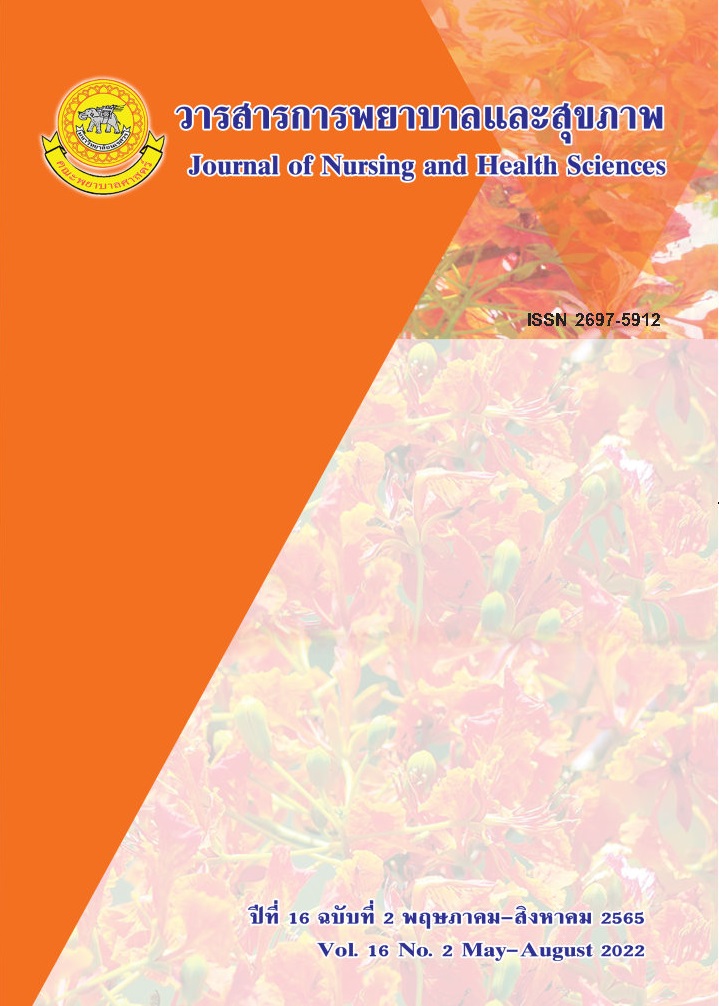The Effects of SKT1 SKT2 and SKT3 Meditation Therapy on Blood Sugar Levels among Non-Insulin Dependent Diabetes Mellitus Patients at Non-communicable Diseases Clinic, Nong Sue District, Pathum Thani Province
Main Article Content
Abstract
Diabetes mellitus is one of the leading causes of death and high public health costs. This quasiexperimental research aimed to study the effect of SKT technique 1, 2 and 3 meditation therapyin reducing
blood sugar level by comparing fasting blood sugar 6-8 hours and cumulative blood sugar level before and
after SKT meditation therapy. The sample consisted of non-insulin dependent diabetesmellitus patients with
cumulative mean plasma glucose > 7 mg% (HbA1c ) obtained from the hospital database. The study was taken
in the period from January 2021 to April 2021 by simple random sampling. They were divided into two groups:
the experimental group 115 and the control group 115.
The research instrument consisted personal data and SKT technique 1, 2 and 3 meditation Therapy
Program. Personal Data were analyzed using frequency, percentage, mean, standard deviation and compared the cumulative blood glucose and fasting blood glucose level 6-8 hours using t-test statistics.
Before practicing SKT technique 1, 2 and 3 meditation therapy, the mean 6-8 hours fasting blood sugar
(FBS) 146.91 mg/dL (S.D. = 25.46) in the experimental group and 140.20 mg/dL(S.D. = 27.04) in the
control group and cumulative blood sugar (HbA1c) of the experimental group 7.94 mg%.(S.D. = 0.50) and
the control group 8.00 mg% (S.D. = 0.56) which is no different
After 12 weeks of practicing SKT technique 1, 2 and 3 meditation therapy, the mean 6-8 hours fasting
blood sugar in experimental group is 111.54 mg/dL (S.D. = 10.86) and 143.44 mg/dL (S.D. = 25.22) in the
control group which are significantly different at p-value = .05 (t = -10.07, p = 0.00). The mean of cumulative
blood sugar after practicing are 7.14 mg% (S.D. = 0.52) and 7.98 mg% (S.D. = 0.70) in the experimental and
the control groups , which are significantly different at p-value = .05 (t = 12.28, p = 0.00).
The practicing of SKT technique 1, 2 and 3 meditation therapy canreduce blood sugar level. It can be
used to complement current treatments in the health care of diabetic patients. This may be used as an
alternative approach to caring for other groups of diabetes patients.
Article Details

This work is licensed under a Creative Commons Attribution-NonCommercial-NoDerivatives 4.0 International License.
References
Chuenkitiyanon, S., & Khomros, W. (2018). The
effectiveness of a meditation therapy program
(SKT) to reduce blood sugar levels in monks
in Phasi Charoen district (Research report).
Bangkok: Faculty of Nursing, Siam University.
Retrieved 7 July 2021 from https://e-research.
siam.edu/wp-content/uploads/2021/02/Nursing-
[In Thai].
Division of Non Communicable Disease. (2018).
Nonthaburi: Non Communicable Disease Division
Department of Disease Control. Retrieved 1
September 2020 from http://www.thaincd.com/
/mission/documents-detail.php?id=13653
&tid=32&gid=1-020 [In Thai].
Hfocus. (2019). Diabetes situation 2018. Retrieved 1
September 2020 from https://www.hfocus.org/
content/2019/11/18054. [In Thai].
Kaewphonpeg, A. (2018). Effects of exercise and
meditation therapy among homebound elders
with non-insulin-dependent diabetes in Wang
Sawap Subdistrict, KhonKaen Province. Eastern
Asia University Heritage Journal Science and
Technology, 12(2), 265-272. [In Thai].
Kwanruen, K.., & Chanida, M. (2019). Factor associated
with Blood sugar controlling among the elderly
with diabetes living in communities nearby Siam
University. Journal Nursing Siam University,
(38), 82-95. [In Thai].
Raksamerwong, R., & Wangphol, P. (2019). The
effectiveness by conducting SKT meditation
therapy 1,3 postures toward HbA1c in DM
patients type 2 in Saimoo Hospital, Yasothon
Province. The Office of Disease Prevention and
Control 10th Journal, 13(2), 28-36. [In Thai].
Rosenzweig, S., Reibel, D. K., Greeson, J. M., Edman, J.
S., Jasser, S. A., McMearty, K. D., & Goldstein,
B. J. (2007). Mindfulness-based stress reduction
is associated with improved glycemic control
in type 2 diabetes mellitus: a pilot study.
Alternative therapies in health and medicine,
(5), 36-38.
The Diabetes Association of Thailand. (2017).
Statistics of diabetes in Thailand. Retrieved 1
September 2020 from https://www.dmthai.org/
index.php/knowledge/for-normal-person/healthinformation-and-articles/health-informationand-articles-old- 2/481-2018-02-05-09-40-68.
[In Thai].
Sirirak, W. (2017). The effectiveness of SKT meditation
therapy in reducing sugar levels in diabetic
patients Research. Thanya Health Promoting
Hospital. Retrieved 7 July 2021 from http://203.
186.16/kmblog/page_research_detail.php?
ResID=484. [In Thai].
Srichaijaroonpong, S. (2018). Effect of SKT3 Meditation
Exercise for controlling HbA1C Type 2 Diabetes Mellitus Patients. (Doctoral dissertation).
Faculty of Medicine, Mahasarakham University,
Mahasarakham. Retrieved 7 July 2021 fromhttps:/
/e-research.siam.edu/wp-content/uploads/2021/
/Nursing-2020. [In Thai].
Taewan, T., Sriphai, P., Jiratada, W., Touchsanee, Y.,
Sutasinee, T., Nitiya, P., …Narinthorn, T.(2020).
Lessons taken from the experience of using SKT
meditation therapy of health personnel.
Nonthaburi: Division of Alternative Medicine
Department of Thai Traditional and Alternative
Medicine Ministry of Health. [In Thai].
Triamchaisri, S.K. (2017). Prayer and healing for
healing[CD]. Bangkok: Division of Alternative
Medicine Department of Thai Traditional and
Alternative Medicine Ministry of Health. [In Thai].
Triamchaisri, S.K. (2018). Meditation practice for
healing health (15th Ed.). Bangkok: Division
of Alternative Medicine Department of Thai
Traditional and Alternative Medicine Ministry of
Health. [In Thai].
Wongwanwattana, W. (2008). Promoting quality of
life in diabetic patients by using SKT 1-2
technique, Bang Krathum Hospital. Northern
regional primary health care journal, 20(1),
-80. [In Thai].
Youngwanichset, S., Phumduang, S., & Ingkhathawornwong,
T. (2013). Effects of issuing programs Tai
Chi exercise on blood sugar levels and health
status of postpartum women with a history of
type 2 diabetes (Research report). Songkla:
Faculty of Nursing. Prince of Songkla University.
[In Thai].
Yingyongmatee, N., Yucharoen, D., Sawangchai, J.,
Wonglaemthong, S., & Nimitpornchai, P. (2020).
The effectiveness of SKT's meditation therapy
on glucose levels in diabetic patients with poor
glycemic control. Region 4-5 Medical Journal,
(2), 75-85. [In Thai].


